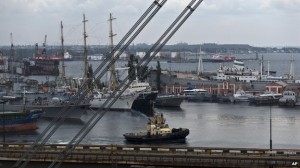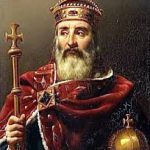The only major European power to make war on Turkey in the nineteenth century was Russia – at least five times. Russia intended to increase her territory around the Black Sea (I have often wondered about that ‘black‘). She also felt she must help the Orthodox Slavs scattered about the Balkans, always under Turkish domination, and badly bullied. The Balkans, one must remember, were part of the Ottoman Empire (q.v.).
In the first of these wars (1787 – 92), through Russia’s penetration of the Caucasus she ‘acquired’ territory between the rivers Dniester and the charmingly named Bug, thus strengthening her control over the northern shore of the Black Sea. Here the Russians built the great port of Odessa, meaning that Russian grain could be exported more easily to western European ports. The second war (1806 – 12) came to a close with the Treaty of Bucharest, by means of which Russia extended her frontier towards another attractively named river – Prut – and the mouth of the Danube. It also handed over a major part of Bessarabia. The third war (1828/9) enabled Russia to capture Adrianoble (different name today) and after peace was declared she collared the southern part of Bessarabia too, as well as part of Armenia.
The brakes were put on after Russia got a bloody nose in the Crimean War (q.v.) and had to concede defeat. She was forced by the Congress of Paris to give southern Bessarabia to Turkey as well as part of the Caucasus. Backwards, forwards, advance, retreat. Then in 1875 a general uprising against Turkey in the Balkans began in Bosnia, before spreading into Serbia and Bulgaria. The revolt was suppressed with customary severity by the Turks, and Russia intervened. The Turks were again defeated and Russia made peace at the Treaty of San Stefano, recovering territory she had lost at the Treaty of Paris. As a matter of fact all Russia’s gains from Turkey were eventually retained, except for that part of the Caucasus in the area around Kars. Turkey recovered this at Brest-Litovsk (q.v.) in 1918. As a rule Russia’s involvement with Turkey over the years formed a serious part of what is called The Eastern Question.









Leave A Comment